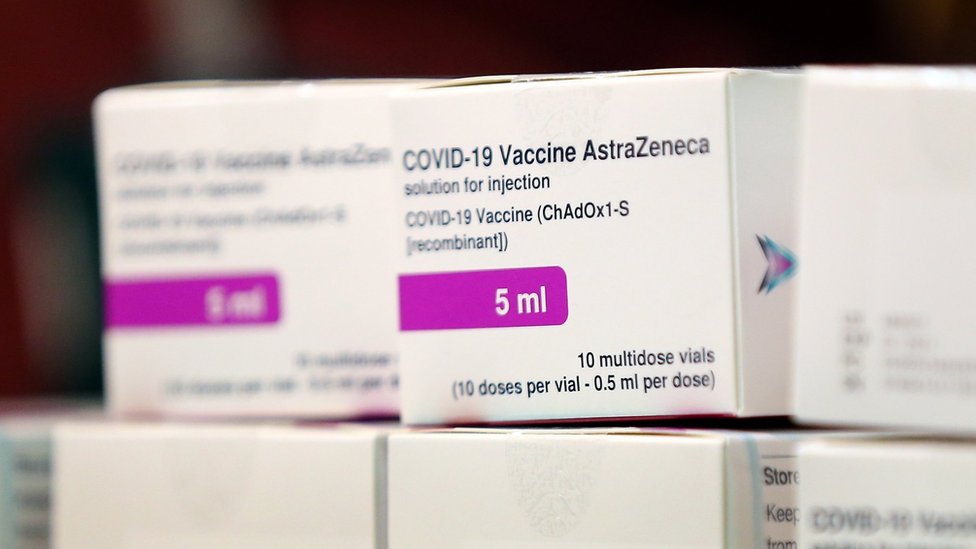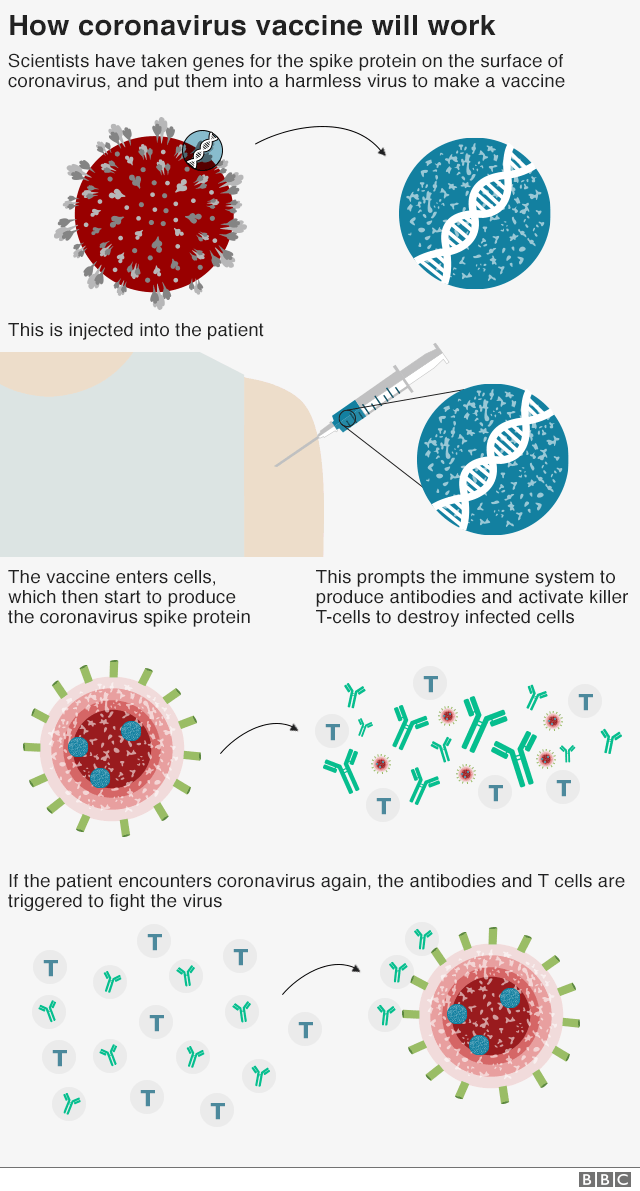Covid-19: Oxford vaccine rolled out to hundreds of GP sites in England

PA Media
The Oxford-AstraZeneca Covid vaccine is being rolled out to hundreds of GP-run vaccination sites in local communities in England from Thursday.
As part of the biggest vaccination programme in NHS history, the aim is to offer jabs to most care home residents by the end of January.
By mid-February, the target is to vaccinate 13 million people in the
top four priority groups.
More than 700 local vaccination sites will administer the jabs.
Another 180 GP-led sites, 100 new hospital sites and a pilot scheme involving local pharmacies will open this week.
It comes after the UK reported another 1,041 deaths within 28 days of a positive coronavirus test, the highest daily death toll since April.
And 62,322 new cases were recorded on Wednesday, the highest daily rise since mass testing began.
- 1.3 million in UK have had their Covid vaccine
- Can we really jab our way out of lockdown?
- What are the UK’s new lockdown rules?
England is now under a third national lockdown – in a bid to prevent the NHS from becoming overwhelmed by the surge in coronavirus cases.
Under the latest rules, people must stay at home except for a handful of permitted reasons, and schools have closed to most pupils.
Next week, seven major vaccination hubs across England are set to begin operating, including the Excel Centre in London and Millennium Point in Birmingham.

Who will get a vaccine first?
Broadly, vaccines are being given to the most vulnerable first, as set out in a list of nine high-priority groups, covering around 30 million people.
They are thought to represent 90-99% of those at risk of dying from Covid-19.
- Residents in care homes for older adults and their carers
- 80-year-olds and over and frontline health and social care workers
- 75-year-olds and over
- 70-year-olds and over and clinically extremely vulnerable individuals
- 65-year-olds and over
- 16- to 64-year-olds with serious underlying health conditions
- 60-year-olds and over
- 55-year-olds and over
- 50-year-olds and over
People aged over 80 in hospital, frontline health staff and care home workers have been the first to get the Pfizer jab at designated hospitals hubs across the UK.

The Oxford jab was initially given to patients in selected hospitals, including first recipient 82-year-old Brian Pinker, and will now be made available to thousands more vulnerable people at community-based sites near to where they live.
Because it doesn’t need to be stored at ultra-cold temperatures like the Pfizer-BioNTech vaccine, it can be transported and stored more easily, making it simpler to vaccinate housebound people and those in care homes.
The Pfizer-BioNTech vaccine was the first to be approved by the UK’s medicines regulator in early December, followed by the British-made Oxford-AstraZeneca vaccine four weeks later.
Around half a million doses of both vaccines are ready to be used this week, with millions more in the pipeline in the coming weeks.
Dr Nikki Kanani, a GP and medical director for primary care at NHS England, said the vaccination programme was “already off to a strong start with around one million people already vaccinated against coronavirus”.
She said GPs, nurses, pharmacists and countless other staff and volunteers had been working “around the clock” to be able to launch almost 200 more sites this week.
“We will now be able to protect many more vulnerable people against the virus and faster,” Dr Kanani said.

AFP
Nearly a quarter of the over-80s in England have now been vaccinated, around 650,000 people, since Margaret Keenan became the first person in the UK to receive a Covid vaccine in December.
Health Secretary Matt Hancock said he was “delighted” care homes residents would begin receiving their first Oxford-AZ jabs this week.
“This will ensure the most vulnerable are protected and will save tens of thousands of lives,” he said.
“As our vaccination programme ramps up, I urge everybody to continue following the latest restrictions to keep cases low and protect loved ones.”
All of the UK is now under strict virus curbs, with Wales, Northern Ireland and most of Scotland also in lockdown, and vaccinations are progressing across the devolved nations.
Scotland’s First Minister Nicola Sturgeon announced a new lockdown on Monday – across mainland Scotland, Skye, Arran, Bute and Gigha for the rest of January. Level three restrictions apply in remaining areas of the nation.
Wales has been in a national lockdown since 20 December, and schools and colleges in the nation will remain closed until at least 18 January.
In Northern Ireland – which entered a six-week lockdown on 26 December – “stay at home” restrictions will be brought back into law from Friday.
As of Monday, about 100,000 people in Scotland had already received a first dose of vaccine. The Scottish NHS hopes to vaccinate everyone over the age of 50 and younger people with underlying health conditions by the start of May, supplies allowing.
More than 35,000 people in Wales have had a Pfizer-BioNTech vaccine, and the Welsh government has said 40,000 doses of the Oxford vaccine will be available within the first two weeks.
About 40,000 people in Northern Ireland have received a first dose, and health officials in the nation have said everyone aged over 80 will be immunised within weeks.
Published at Thu, 07 Jan 2021 01:17:40 +0000






Comments
Loading…